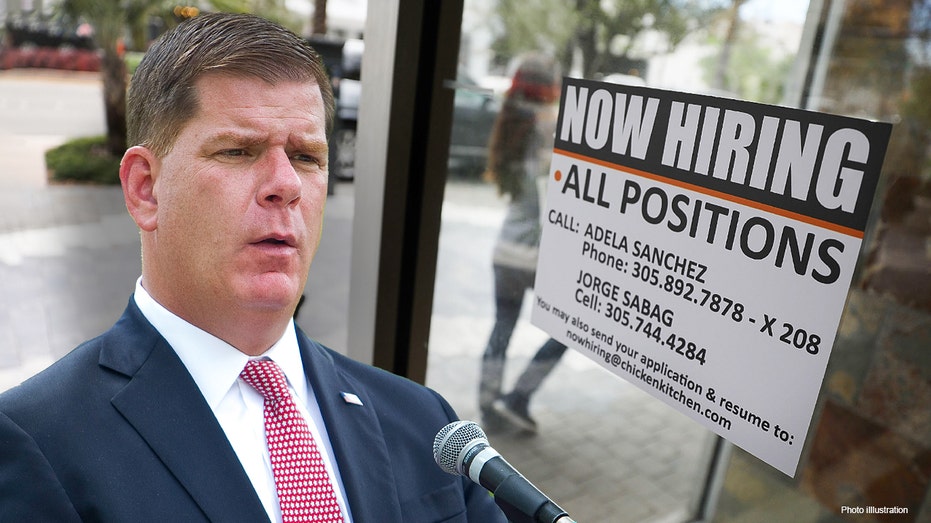Labor Secretary Marty Walsh: 'None' of the inflationary pressures caused by Biden admin
White House talks to FOX Business after US economy soars past expectations with 528,000 jobs added in July
Labor Secretary Marty Walsh argues 'none' of the price pressures caused by Biden admin
FOX Business' Edward Lawrence speaks with Labor Secretary Marty Walsh following the release of the July employment report.
Labor Secretary Marty Walsh argued shortly after the release of the July employment report Friday that "none" of the price pressures Americans have been dealing with were caused by the Biden administration.
He also laid out the actions the administration has been taking to try and lower costs as the latest data revealed inflation sits at a 40-year high, pointing to "actions on the ports" to alleviate supply chain issues, the release of oil reserves in an attempt to bring down gas prices and the Inflation Reduction Act.
Senate Majority Leader Chuck Schumer and Sen. Joe Manchin last week announced the Inflation Reduction Act, which will spend $433 billion primarily on climate initiatives while imposing a 15% minimum tax on large corporations.
"I think this is an all of government approach, if you will, to bring these costs down, these pressures down," Walsh told FOX Business’ Edward Lawrence in an interview that aired on "Cavuto: Coast to Coast" Friday. He then added that "none of this was caused by this administration, quite honestly," putting the blame partly on the COVID-19 pandemic.
Markets will be in for a rude awakening: Stephanie Pomboy
MacroMavens founder Stephanie Pomboy and former Reagan economic adviser Steve Moore weigh in on the July employment report shortly after its release on 'Mornings with Maria.'
"And this is a global recession. We can't lose sight of that," he continued. "What’s happening here in the United States is happening all across the globe and, quite honestly, in a higher level in some places. "
The labor secretary made the comments after it was revealed that U.S. job growth unexpectedly accelerated in July, defying fears of a slowdown in hiring even as the labor market confronts the double threats of persistent inflation and rising interest rates.
Employers added 528,000 jobs in July, the Labor Department said in its monthly payroll report released Friday, blowing past the 250,000 jobs forecast by Refinitiv economists. The unemployment rate, meanwhile, edged down to 3.5%, the lowest level since the COVID-19 pandemic began more than two years ago.
The uptick in hiring comes amid a growing consensus that the economy is losing momentum as the Federal Reserve hikes interest rates at the fastest pace in decades to wrestle inflation under control.

Labor Secretary Marty Walsh weighs in on the July employment report. (Getty Images)
With back-to-back quarterly declines in gross domestic product – the broadest measure of goods and services produced in the nation – the economy meets the technical criteria for a recession. Many economists have argued the strong jobs market has so far prevented the U.S. from sliding into a downturn, while others, including MacroMavens founder Stephanie Pomboy, argue that the employment data is misleading given it is a "lagging indicator."
Pomboy warned on FOX Business Friday that the Fed "really put most of their eggs in this employment basket and they’re looking at a lagging indicator to tell them when it’s time that they have tightened enough, which suggests that they are going to overdo it on the rate hikes."
MARKETS WILL BE IN FOR A 'RUDE AWAKENING’ FOLLOWING JOBS REPORT, ECONOMIST WARNS
The Commerce Department reported last month that GDP shrank 0.6% in the three-month period from April to June. That followed a decline of 1.6% in the first three months of the year.
President Biden said last week the United States "is not in a recession," despite the latest GDP report.
Biden's 'Inflation Acceleration Act' will add to US debt: GOP congressman
House Budget Committee member Buddy Carter criticizes the president for trying to spend his way out of a recession, telling 'Cavuto: Coast to Coast.' this will add to America's rising debt.
"Coming off of last year’s historic economic growth — and regaining all the private sector jobs lost during the pandemic crisis — it’s no surprise that the economy is slowing down as the Federal Reserve acts to bring down inflation," Biden said in a statement last week. "But even as we face historic global challenges, we are on the right path and we will come through this transition stronger and more secure."
Biden then touted the job market, saying it "remains historically strong" and pointed to unemployment and consumer spending data.
Those comments from the president came days after he said the U.S. was "not coming into recession."
"We're not coming into recession, in my view," Biden said.
Walsh acknowledged Friday that "we have a ways to go" given "people are still feeling the pressure."
He added that he is now focused on "making sure we’re working with the president to pass his Inflation Reduction Act that's in front of Congress now and part of that bill will bring down, hopefully, the cost of inflation that people are feeling in their pocketbook today."
Walsh then pointed to the drop in gas prices, "which is putting a little more money in people's pocket."
Gas prices have been steadily declining since reaching a high of $5.01 on June 14. On Friday, the national average for a gallon of gas was $4.11, according to AAA.
FOX Business’ Megan Henney contributed to this report.























